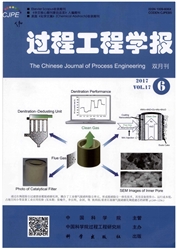

 中文摘要:
中文摘要:
以承德建龙特殊钢有限公司现场条件为依据,通过烧结杯实验模拟碱度僻)对含铬型钒钛磁铁矿烧结性能的影响,分析了其显微结构.结果表明,随碱度提高,烧结速度先增大后减小,R=2.5时最大,为19.70mm/min,烧损增大;R=2.7时转鼓强度最高,为63.53%;碱度提高改善含铬型钒钛烧结矿的低温还原粉化指数(RDI),R=2.7时大于3.15mm的颗粒的RDI最高,为75.09%;碱度增大生产率先增大后减小,R=2.5时最高,为1.35t/(m2·h).R-2.1~2.5时燃耗比上升,R=2.1时最低,为43.21kg/t.碱度提高有利于提高软化开始和软化终了温度,改善含铬型钒钛烧结矿的软化性能、矿物组成及结构,是其性能改善的内因.该矿适宜的生产碱度为2.5.
 英文摘要:
英文摘要:
The effect of basicity (R) on sintering of Cr-bearing vanadium and titanium magnetite ore was studied via sintering pot experiment on the basis of production conditions in Chengde Jianlong Special Steel Company, and the sinter characterized. The results showed that with the increase of basicity, the sintering rate rose firstly, and then fell with a increasing burning loss, leading to a max sintering rate of 19.70 ram/rain at R=2.5. Tumbler strength of sinter had the maximum value was 63.53% when the basicity was 2.7. Meanwhile, increasing the basicity was beneficial to the improvement of low-temperature reduction degradation index (RDI) of sinter, and its maximum value of powders size larger than 3.15 mm was 75.09% at R=2.7. Moreover, with the increase of basicity, productivity rose firstly, then fell, and had a maximum value of 1.35 t/(mE.h) when R=2.5. The fuel consumption ratio rose at R=2.1-2.5, and its minimum value was 43.21 kg/t when R=2.1. In addition, increasing basicity was also beneficial to the softening properties through improving the beginning and ending softening temperatures of sinter. The improvement in mineral composition and structure aroused by increasing the basicity was the essential reason for improving sintering properties. Overall, the ootimal basicitv of V-Ti-Cr sinter for industrial anolication was 2.5.
 同期刊论文项目
同期刊论文项目
 同项目期刊论文
同项目期刊论文
 Vanadium-titanium magnetite ore blend optimization for sinter strength based on iron ore basic sinte
Vanadium-titanium magnetite ore blend optimization for sinter strength based on iron ore basic sinte Influence of MgO in the form of magnesite on properties and mineralogy of high-Cr vanadium and titan
Influence of MgO in the form of magnesite on properties and mineralogy of high-Cr vanadium and titan Sintering behaviors and consolidation mechanism of high-chromium vanadium and titanium magnetite fin
Sintering behaviors and consolidation mechanism of high-chromium vanadium and titanium magnetite fin Preliminary study on photocatalytic degradation of methyl orange and Cr(VI) compound system by titan
Preliminary study on photocatalytic degradation of methyl orange and Cr(VI) compound system by titan Photocatalytic oxidation of methyl orange over titania-bearing blast furnace slag photocatalysts and
Photocatalytic oxidation of methyl orange over titania-bearing blast furnace slag photocatalysts and Preparation of UV-visible light responsive photocatalyst from titania-bearing blastfurnace slag modi
Preparation of UV-visible light responsive photocatalyst from titania-bearing blastfurnace slag modi Preparation and characterization of Zn/Ce/SO42--doped titania nano-materials with antibacterial acti
Preparation and characterization of Zn/Ce/SO42--doped titania nano-materials with antibacterial acti Preparation and Characterization of Zinc and Cerium Co-doped Titania Nano-materials with Antibacteri
Preparation and Characterization of Zinc and Cerium Co-doped Titania Nano-materials with Antibacteri A new process of gas-based direct reduction electric furnace smelting separation for high chromium v
A new process of gas-based direct reduction electric furnace smelting separation for high chromium v Preparation and characterization of carbon or/and boron-doped titania nano-materials with antibacter
Preparation and characterization of carbon or/and boron-doped titania nano-materials with antibacter 期刊信息
期刊信息
